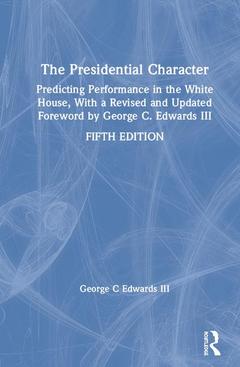The Presidential Character (5th Ed.) Predicting Performance in the White House, With a Revised and Updated Foreword by George C. Edwards III

A book entitled The Presidential Character is more timely and necessary than ever. This new issue of James David Barber?s classic work appears almost 50 years after its first publication and yet reads like a roadmap to the 2020 presidential election. Its subtitle, ?Predicting Performance in the White House,? is an apt reflection on the election of 2016.
With a revised and updated foreword by George C. Edwards III that brings in the Trump Administration, this book argues that patterns in a person?s character, world view, and political style can allow us to anticipate his or her performance as president. How would Barber have categorized Donald J. Trump, who appears to defy every presidential type and norm? This question suggests one of the most provocative and appealing reasons for students, scholars, and voters to re-read The Presidential Character at this particular juncture. What should we look for in a president? This text offers explanations and predictions of the performance of past presidents and presidential candidates with many cautionary tales looking forward.
Features
- Presents a revised and updated foreword by presidential scholar George C. Edwards III, Distinguished Professor of Political Science at Texas A&M University, that includes the advent of the Trump Administration and highlights the book?s classic and enduring contributions.
- Includes predictions of presidential performance from Nixon to Bush.
- Analyzes the media?s role in providing information about the political candidates and in shaping public opinion of them.
- Draws on historical, biographical, and psychological research to help voters make judicious choices in determining the country?s highest leaders.
- Encourages citizens to be actively involved scholars, critics, and participants in their government.
1. PRESIDENTIAL CHARACTER AND HOW TO FORESEE IT 2. THREE TRAGIC TALES 3. THE ACTIVE-NEGATIVE PRESIDENTS 4. THE ORIGINS OF PRESIDENTIAL COMPULSION 5. RICHARD NIXON: CONSTRUCTION AND DESTRUCTION 6. THE PASSIVE-NEGATIVE PRESIDENTS 7. THE PASSIVE-POSITIVE PRESIDENTS 8. REAGAN’S RISE AND RULE 9. FRANKLIN D. ROOSEVELT AND ACTIVE-POSITIVE AFFECTION 10. HARRY S TRUMAN AND ACTIVE-POSITIVE COMBAT 11. JOHN F. KENNEDY AND ACTIVE-POSITIVE COMMITMENT 12. THE CRUCIAL FORD TRANSITION 13. JIMMY CARTER: PREDICTED AND REVIEWED 14. GEORGE BUSH: THE WORLD VIEW DILEMMA 15. ADDING IT UP
James David Barber was a Duke University political scientist and provocateur best known for exploring the psychology of Oval Office aspirants and occupants. He spent years as a consultant to "NBC Nightly News" and as a board member of the Poynter Institute, a center for the study of journalism and media ethics in St. Petersburg, Florida.
Date de parution : 10-2019
18.9x24.6 cm
Date de parution : 10-2019
18.9x24.6 cm
Thème de The Presidential Character :
Mots-clés :
Rural Free Delivery; white; Young Man; house; Edwards III; real world politics; CIA Briefing; presidential leadership; United States Navy; presidential performance predictions; Dead Man; presidential decisions; CIA Director; active-positive presidency; Active Positive Presidents; Home Town; Active Negative President; Passive Positive President; Bush's World View; Good Life; Active Positive Character; Prescott Bush; George's Father; Independent Political Success; Active Negative Character; Active Negative Type; Lou Cannon; Hamilton Jordan; Early Life Histories; England Slept; President's World View; CIA Activity



